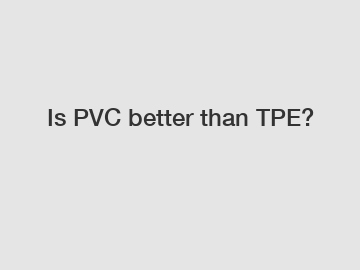Is PVC better than TPE?
When it comes to choosing the best material for your needs, the decision between PVC and TPE can be a tough one. Both materials have their own unique qualities and benefits, making it important to understand the differences before making a decision. In this blog post, we will explore the pros and cons of both materials to help you determine which is better suited for your specific requirements.
Let's start by discussing PVC, or polyvinyl chloride. PVC is a widely used material known for its durability and versatility. It is a synthetic plastic that is highly resistant to chemicals, making it an excellent choice for applications that require resistance to harsh environments. PVC is also known for its cost-effectiveness, making it a popular choice for a wide range of industries.
One of the key benefits of PVC is its durability. PVC is a rigid material that can withstand a high level of stress, making it ideal for applications where strength and resilience are important. PVC is also resistant to moisture, making it suitable for outdoor use and applications where exposure to water is a concern. Additionally, PVC is easy to clean and maintain, further enhancing its longevity and usability.

However, despite its many benefits, PVC does have some drawbacks. One of the main concerns about PVC is its environmental impact. PVC is a plastic material that is not biodegradable, meaning it can contribute to pollution and harm the environment if not disposed of properly. Additionally, PVC can release harmful chemicals when exposed to heat or sunlight, posing a potential health risk in certain situations.
On the other hand, TPE, or thermoplastic elastomer, is a material that offers a different set of advantages and disadvantages. TPE is a versatile material that combines the characteristics of rubber and plastic, making it flexible and durable. TPE is known for its soft texture and elasticity, making it an excellent choice for applications that require flexibility and cushioning.
One of the key benefits of TPE is its resistance to chemicals and oils. TPE is highly resistant to a wide range of chemicals, making it a popular choice for applications that require resistance to harsh environments. TPE is also non-toxic and safe for use in food and medical applications, making it a versatile material for a wide range of industries.
However, like PVC, TPE also has its drawbacks. TPE is not as durable as PVC, making it less suitable for applications that require high levels of strength and resilience. Additionally, TPE is more susceptible to damage from UV exposure, meaning it may not be the best choice for outdoor applications or environments with high levels of sunlight.
In conclusion, the decision between PVC and TPE ultimately comes down to your specific requirements and preferences. If you need a durable, cost-effective material that is resistant to chemicals and moisture, PVC may be the best choice for you. On the other hand, if you require a flexible, non-toxic material that is safe for use in food and medical applications, TPE may be the better option.
Ultimately, both PVC and TPE have their own unique qualities and benefits, making them suitable for different applications and industries. By understanding the pros and cons of each material, you can make an informed decision that best meets your needs.
The company is the world’s best hot press mold, car floor mat making machine, 5d vs tpe matting supplier. We are your one-stop shop for all needs. Our staff are highly-specialized and will help you find the product you need.

Comments
0